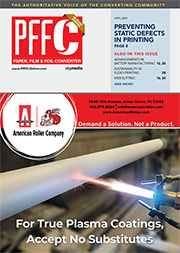Featured Stories
-
Advantages of Shear, Razor and Crush Web Slitting Techniques
When choosing a slitting method, many factors must be considered, including interaction with inspection systems. -
Revolutionizing Lithium-lon Battery Manufacturing Advances in Slot-Die and Electrode Coating Technology
As the global battery market surges toward an estimated $328 billion by 2028, innovations in manufacturing processes are becoming increasingly... -
Nordson Divisions Collaborate to Achieve Unprecedented Flat Profile Time
Nordson Measurement & Control Solutions (a division of Nordson Corporation) is a global leading provider of gauging systems for the film...
News | New Products
-
Morris Packaging to Add New KY Flex-pack Plant
Bloomington, IL-based Morris Packaging plans to build a new $60.9-million production plant in Marion County (KY), a project that will create 276 full-time jobs.
-
Press Belt Manufacturer IPCO to Focus on Engineering and Service Expertise
IPCO will use Ligna 2025 to highlight the service and support services it provides to press manufacturers and WBP producers alike.
-
INX promotes seven Executives to Vice President positions
INX International Ink Co. has announced the Board of Directors has approved the promotions of seven key people to Vice President positions.
-
Bimec and Flex CA Strengthen U.S. Market Presence with a new installation at Cello-Wrap Packaging Inc.
Bimec and Flex CA proudly announce a new milestone in their U.S. market expansion with the recent commissioning of a state-of-the-art slitter rewinder at Cello-Wrap Packaging Inc, located in Farmersville - TX.
-
New Era Converting promotes industry veteran Stephen Pickett to controls engineering manager
New Era Converting, an IPCO company, has announced that Stephen Pickett is taking on a new role as controls engineering manager.
-
Fedrigoni Announces New Slitting Center for Self-Adhesive Labels in Germany in Q4 2025
The Fedrigoni Group - a world reference in the manufacturing of self-adhesive labels, special papers for packaging and other creative applications, graphic supports for visual communication and RFID
-
Advancing Label Innovation Through Collaboration
Packaging is a physical representation of a brand’s identity, and label converters play an essential role in bringing the packaging experience to life.
Expert Advice
Coating & Laminating Special Report, Part 5
- Published: December 31, 2004, By Mark T. Chappell, InteliCoat Technologies
Part 1 | Part 2 | Part 3 | Part 4 | Part 5 | Part 6
The Case for Contract Coating
Many companies in the graphics, medical, and electronics industries make use of external resources to meet their manufacturing needs. Even those that consider in-house manufacturing a core competence are under increasing pressure to balance the need to react quickly to market dynamics against the risks/long lead times associated with capital investments.
In the converting industry, the investment in capital and people is particularly high. Even though the initial cost of a fully equipped coating line may be reasonable, the unidentified cost is in the training and expertise of the people responsible for its design, running, and operations.
A contract coating company can offer versatile coating capability both in terms of technology and run size, from large-scale operations to small-scale trial facilities.
It is unusual for a single coating technology to be optimal for every product. During product development, it can be beneficial to access a range of coating options—a strong case for outsourcing. This approach can reduce overall production time and optimize time spent on expensive equipment. However, for the manufacture of certain constructions, the application of one coating directly onto another during one pass may be the only suitable approach. Other characteristics may be achieved only through the drying/curing method: The ability to dry off solvent-based systems before cross-linking with UV, for example, can offer unique properties.
With ever-increasing regulatory issues concerning the safe and environmentally friendly disposal of hazardous waste, the cost of monitoring and updating compliance with manufacturing practices can be costly (and has to be paid for upfront). This situation can be improved through the outsourcing of coating processes, as the "supplier" is responsible for these issues and their implementation. Contract coating companies are obliged to be expert in solvent handling.
The investment in environmental control equipment is likely to be significant and often can be fully justified only when the utilization is high. Given a downturn in the market or a change in technology or solvent type, such equipment still needs to be maintained and kept running. A contract manufacturer active in a range of industries is in a better position to absorb these fluctuations in market demand.
Time Savings and Cost Benefits
A critical savings made through outsourcing is in time. Contract coaters have experience handling a range of coatings—especially during the development process. Investing in external contract coating can reduce OEMs’ time, while giving them access to commissioned equipment and trained teams that can meet a range of challenging requirements using a variety of coating methods and curing systems.
Outsourcing eliminates the investment in time required for building and commissioning specialist manufacturing facilities and enables companies to respond rapidly to developments in their markets. For any business that suffers from fluctuations in demand due to economic or market factors, outsourcing can introduce stability and help absorb fluctuations in the market. A significant element of risk is attached to in-house manufacturing, with the obligatory capital investment, recruiting and training staff, and the cost of regulatory compliance.
Other associated costs include the development of new manufacturing infrastructures, quality production equipment, and monitoring. Clean room manufacturing also is becoming increasingly important for meeting stringent cosmetic and visual standard specifications.
Joint Development Programs
Benefits accrue from joint programs involving in-house and outsourced resources.
Teams of chemists, materials scientists, and process engineers are needed to ensure products under development meet performance, quality, and cost targets. Their experience allows them to adjust formulations accordingly to match process conditions to product performance. Close cooperation is essential between both parties to ensure the learning process that accompanies product development is quick, effective, and free from risk. Formulations developed in R&D labs may not be appropriate for the demands of large-scale manufacturing, and material webs may require special treatments to achieve the desired adhesion performance.
It is essential contract manufacturers recognize the need to safeguard confidentiality when taking product designs through to the end-product in the market. Their commitment to total confidentiality is a core competency as a business partner to OEMs.
Factors Influencing the Decision
Many factors are involved in this decision: Customer satisfaction can vary widely for reasons that go beyond technology, capacity, and cost. Customers first have to identify their strengths and weaknesses and decide which processes to outsource. The next step is to locate contract manufacturers with the appropriate expertise and agree on requirements for price, services, and performance, taking into account the labor cost required to perform the task internally and the best method of minimizing financial risk.
The reason for performing trials and cost/risk analyses is to reveal the benefits of outsourcing particular processes. Contract coaters are experienced in facilitating evidence-based decisions and regularly perform pilot and large-scale manufacturing for companies still deciding whether to outsource or to finance in-house coating options but lack sufficient scale-up capability.
Contract coating can enable companies to meet manufacturing requirements cost effectively, at relatively short notice, and provide OEMs with the flexibility to respond to their market to maintain competitive advantage.
Mark T. Chappell is sales and marketing director, Europe, for InteliCoat Technologies, intelicoat.com.
Part 1 | Part 2 | Part 3 | Part 4 | Part 5 | Part 6













